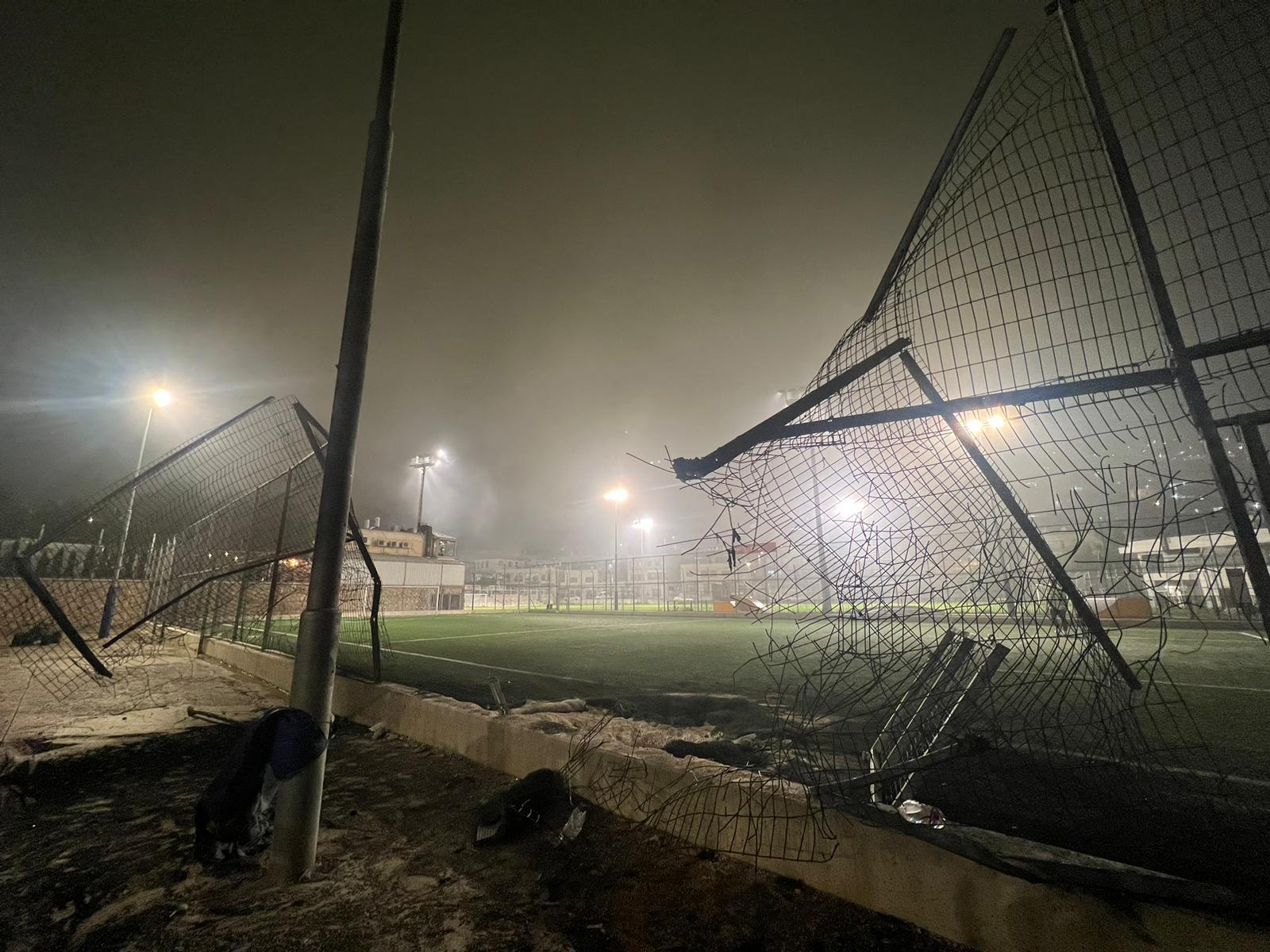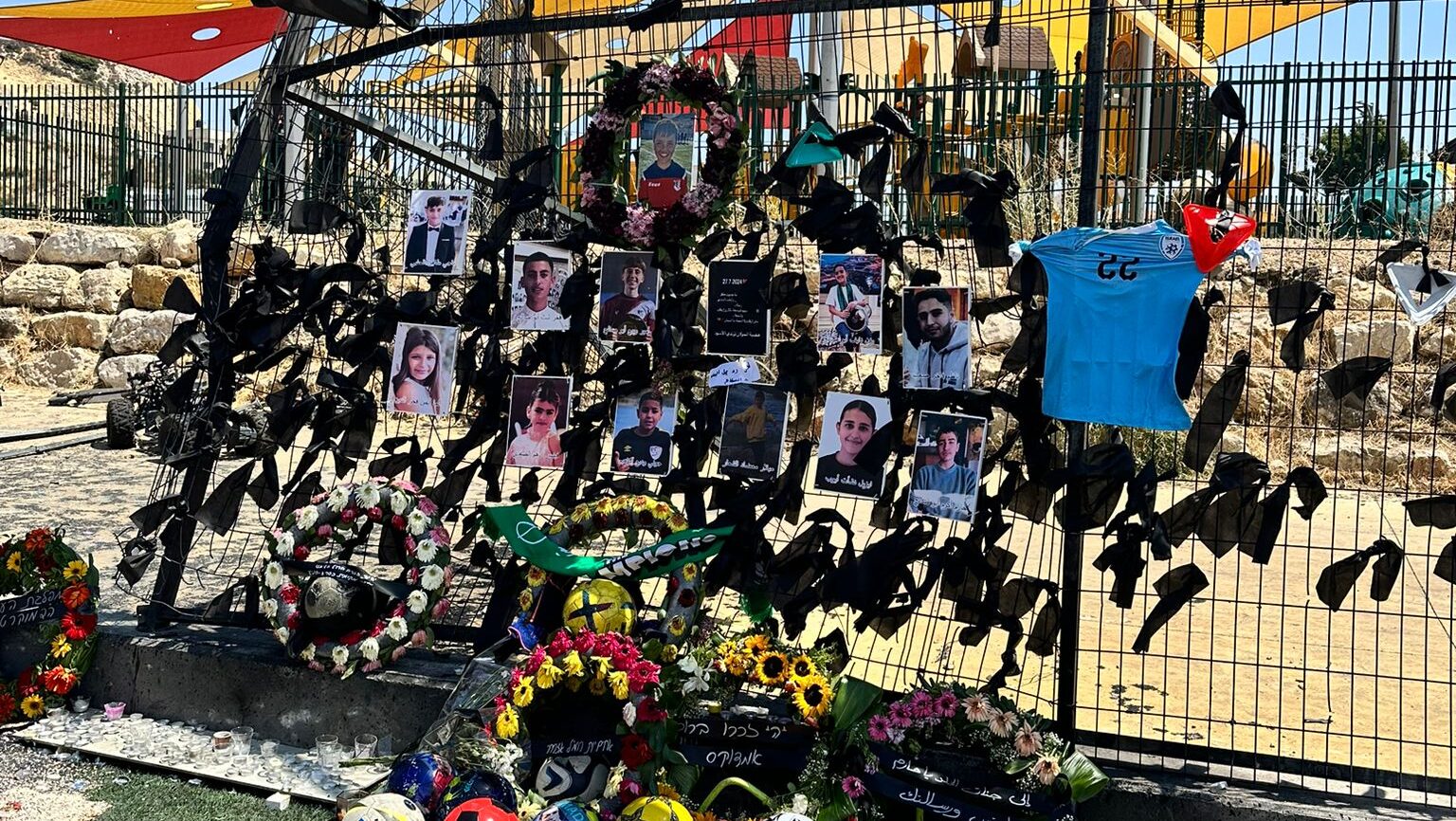‘The Druze Are Going Nowhere, Regardless of Cost,’ IDF Colonels Tell TML
Following the deadly rocket attack on the Druze town of Majdal Shams, which killed 12 children, the community is in mourning, with tensions rising
Going up north, you pass through ghost towns until you reach those Druze villages close to the border with Lebanon and Syria, whose inhabitants, despite the war, remained.
Since the July 27 rocket attack, which hit the Druze town of Majdal Shams in the northern Golan, causing the death of 12 children and injuring 50 others, the village has been mourning.
The shops are closed, and people prefer not to discuss the accident. Most of them stare silently at the children’s pictures hung on a net on the football pitch while the sound of explosions occurring just a few kilometers away can be heard in the background.
That afternoon, the Iron Dome alert set off at 6:18 p.m., but the rocket landed less than a minute later, giving the children no chance of reaching the nearby shelter.

(IDF Spokesperson’s Unit)
The Israeli military went to the site to understand what may have caused the accident and found rocket fragments, which have been identified as parts of an Iranian-made Falaq rocket, which has a maximum range of 10 km and is a tool that only Hezbollah possesses.
The IDF estimated that the launch was fired by the Iran-backed militia from the north of the Lebanese town of Chebaa, about 10 km away from Majdal Shams.
As Sarit Zehavi, lieutenant colonel and founder of the Alma Center, explained to The Media Line: “That day, Hezbollah claimed at 7:30 pm responsibility for launching a Falaq 1 rocket towards a military base on the Mount Hermon area. Half an hour later, they denied involvement and started speculating that it was a misfire from the Iron Dome.”
The majority of the Druze in the Golan consider themselves citizens of Syria, where the government in Damascus is a Hezbollah ally. A strike on this community could hurt the group’s standing, including their relationship with the Druze living in the country, which has been supportive of Hezbollah and faithful to Lebanon until now.
“We were expecting this scenario, unfortunately, since Hezbollah has been targeting the north of Israel nonstop since October 8th. The terrorist organization always claimed proudly these attacks, but this time, they were afraid to do so due to the fear that the Lebanese Druze may have turned against them. So, this is the way they blamed Israel,” Zehavi added.
This holiday season, give to:
Truth and understanding
The Media Line's intrepid correspondents are in Israel, Gaza, Lebanon, Syria and Pakistan providing first-person reporting.
They all said they cover it.
We see it.
We report with just one agenda: the truth.


In response to this, many Druze leaders in Lebanon, Syria, and Israel spoke out against what they called an attempt to drive a wedge within the close-knit community.
In Lebanon, Walid Jumblatt, a Druze political leader, said in an interview with Al Jazeera: “It is Israel’s fabrication attempt to blame the “resistance” (Hezbollah), but this is nothing but a lie.”
It is impossible that this was an Iron Dome misfire because the interceptor explodes in the sky and doesn’t cause a blast like the one we saw. The air defense missiles are designed to disperse regular-shaped fragments in every direction, but there was no sign of this fragmentation.
“It is impossible that this was an Iron Dome misfire because the interceptor explodes in the sky and doesn’t cause a blast like the one we saw. The air defense missiles are designed to disperse regular-shaped fragments in every direction, but there was no sign of this fragmentation,” stated Zehavi.

(IDF Spokesperson’s Unit)
Abed Kanaaneh, an expert on Lebanon and the Middle East at The Middle Eastern and African History Department at Tel Aviv University, explained as well: “The occupied- Golan Heights were targeted by Hezbollah that day with 100 rockets, so it is plausible that one of them hit the village of Majdal Shams. The Druze were, of course, not the target, but one of these missiles could have missed its shot and caused the catastrophe.”
Arab media didn’t acknowledge Hezbollah’s role in this but promoted its statements of denial.
Arab people are currently not the ‘biggest fans’ of Israel since they saw that the country has been targeting children in the Gaza Strip in the past months, it was easier for them to say that Israel could have killed these children as well, to have an excuse to invade Lebanon. There is a lot of mistrust towards Israel now, so this is why many believe Hezbollah’s version.
“Arab people are currently not the ‘biggest fans’ of Israel since they saw that the country has been targeting children in the Gaza Strip in the past months, it was easier for them to say that Israel could have killed these children as well, to have an excuse to invade Lebanon. There is a lot of mistrust towards Israel now, so this is why many believe Hezbollah’s version,” Kanaaneh added.
The Media Line went on July 30 to the site of Majdal Shams to speak with several Druze-Israeli and Jewish-Israeli IDF colonels to understand what the Israeli response could have been.
“The Druze people of this village do not want a retaliation because they want to keep their neutrality in the conflict and fear for their relatives who live in southern Lebanon that may be targeted in Israel’s response. They prefer to pursue peace and stay here regardless of the cost,” Hamada Ghanim, Druze’s former military attaché in Europe and infantry battalion commander on the northern border, mentioned to The Media Line.
He noted, “As Druze, despite our different geographical locations and political stands, we are one community, so of course we prefer diplomacy instead of war.”
The lieutenant colonel and former intelligence officer of the IDF, Gidi Harari, mentioned on the matter: “We wish that a diplomatic solution could solve this war with Hezbollah, but unlike us, they have no duty in front of the international community and won’t opt out to follow the rules, as they did with previous UN resolutions. So, we must shoot hard now and strongly, not only in the Hezbollah southern-controlled part but all of Lebanon, if necessary. Hezbollah wants the Druze to go away from here, but they are not going anywhere.”
There will be a strong hit against Hezbollah, but always within the limits of the game to prevent a total war. I think both sides won’t be interested in opening a wider conflict, but you never know what could instigate the opposite.
“There will be a strong hit against Hezbollah, but always within the limits of the game to prevent a total war. I think both sides won’t be interested in opening a wider conflict, but you never know what could instigate the opposite,” concluded Kanaaneh.
Yesterday, the IDF killed in Beirut Fuad Shukr, one of the top senior commanders of Hezbollah, which, according to the military, was behind the Majdal Shams’ attack. As a response, the militia targeted rockets throughout the evening in the northern part of Israel. Everyone is wondering if this could lead to a total war or would simply stop there.

(IDF Spokesperson’s Unit)
Giorgia Valente is a recent graduate of Ca’ Foscari University of Venice and an intern in The Media Line’s Press and Policy Student Program.

